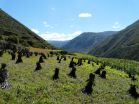Shrinking budget? Consumers choose less variety when investing or shopping
2015-04-29
(Press-News.org) When consumer budgets grow or shrink, how do spending habits change? A common view is that people with a budget will spend their money on the same number of products, even when their previous budget was lower or higher. But in order to keep their favorite items, consumers whose budgets have shrunk to a particular amount will opt for less variety than someone whose budget has increased to that same amount, according to a new study in the Journal of Marketing Research. Investors beware!
"We call this the budget contraction effect," write authors Kurt A. Carlson (Georgetown University), Jared Wolfe (Long Island University), Simon J. Blanchard (Georgetown University), Joel C. Huber (Duke University), and Dan Ariely (Duke University). "Instead of spreading losses evenly across many items, consumers prefer to focus a shrinking budget on a narrower set of preferred products."
Study participants were asked to imagine that they had won a shopping spree at Costco. They were to distribute spending across nine different products: muffins, bread, M&Ms, Power Bars, apple sauce, ravioli, two kinds of pizza, and cheesecake. They began with a $40 budget and wrote down how much of each product they would buy. They repeated the process with an $80 shopping spree, and finally a $120 spree. The conditions were the same for people in the contracting budget study, except that the first budget was $120, the second was $80, and the final budget was $40.
The authors found that consumers whose budget had shrunk significantly reduced the variety of products they chose to buy, preferring to eliminate some items altogether in order to maintain favorite items at a level they had become used to under the higher budget. This tendency applied not only to grocery items, but to investment and travel decisions as well.
"It is vital to understand the budget contraction effect. During economic downturns, consumers with falling budgets may be tempted to move their money into a smaller number of investments, creating a more risky portfolio. Familiarizing people with the budget contraction effect could help them avoid such dangers and develop a better understanding of how to deal with harsh economic circumstances," conclude the authors.
INFORMATION:
Kurt A. Carlson, Jared Wolfe, Simon J. Blanchard, Joel C. Huber, and Dan Ariely. "The Budget Contraction Effect: How Contracting Budgets Lead to Less Varied Choice." Forthcoming in the Journal of Marketing Research. For more information, contact Kurt A. Carlson (kurt.carlson@georgetown.edu) or Mary-Ann Twist (mtwist@ama.org).
ELSE PRESS RELEASES FROM THIS DATE:
2015-04-29
(NEWARK, NJ) - April 29, 2014 - A woman is brutally assaulted, but rather than receiving the sympathy she deserves, she is blamed. If she had dressed differently or acted differently, or made wiser choices, others say, she would have been spared her ordeal. For victims, this "victim blaming" is profoundly hurtful, and can lead to secondary victimization.
Psychologists have long realized that blaming victims is a defense mechanism that helps blamers feel better about the world, and see it as fair and just. But ways to prevent victim blaming have been elusive -- until ...
2015-04-29
The sun's surface is blisteringly hot at 10,340 degrees Fahrenheit -- but its atmosphere is another 300 times hotter. This has led to an enduring mystery for those who study the sun: What heats the atmosphere to such extreme temperatures? Normally when you move away from a hot source the environment gets cooler, but some mechanism is clearly at work in the solar atmosphere, the corona, to bring the temperatures up so high.
Clear evidence now suggests that the heating mechanism depends on regular, but intermittent explosive bursts of heat, rather than on continuous gradual ...
2015-04-29
MISSOULA - Improved drilling technologies and energy demand have resulted in the large-scale expansion of oil and gas development, with 50,000 new wells drilled per year recently in central North America. Locations such as the Bakken, Eagle Ford and the Marcellus Shale are now commonplace, and drilling activity frequently makes news.
But what are the ecological consequences of this accelerated drilling activity? Researchers at the University of Montana have conducted the first-ever broad-scale scientific assessment of how oil and gas development transforms landscapes ...
2015-04-29
Casting a large interdisciplinary research net has helped Simon Fraser University archaeologist Dana Lepofsky and 10 collaborators dig deeper into their findings about ancient clam gardens in the Pacific Northwest to formulate new perspectives.
Lepofsky's research team has discovered that Northwest Coast Indigenous people didn't make their living just by gathering the natural ocean's bounty. Rather, from Alaska to Washington, they were farmers who cultivated productive clam gardens to ensure abundant and sustainable clam harvests.
In its new paper published by American ...
2015-04-29
Being bigger and bolder holds various benefits for male soldier beetles. They enjoy higher rates of successful courtship and more often land a larger, more fertile mate. These are some of the findings of a study led by Denson McLain of the Georgia Southern University in the US, published in Springer's journal Behavioral Ecology and Sociobiology.
The goldenrod soldier beetle or Pennsylvanian leatherwing (Chauliognathus pennsylvanicus) is native to Northern America. During its peak reproductive season, between September to early October, it only mates once a day. This normally ...
2015-04-29
CHICAGO -- Genetic testing of Iñupiat people currently living in Alaska's North Slope is helping Northwestern University scientists fill in the blanks on questions about the migration patterns and ancestral pool of the people who populated the North American Arctic over the last 5,000 years.
"This is the first evidence that genetically ties all of the Iñupiat and Inuit populations from Alaska, Canada and Greenland back to the Alaskan North Slope," said Northwestern's M. Geoffrey Hayes, senior author of the new study to be published April 29, 2015, in the American ...
2015-04-29
PULLMAN, Wash.--Climate change may be responsible for the abrupt collapse of civilization on the fringes of the Tibetan Plateau around 2000 B.C.
WSU archaeologist Jade D'Alpoim Guedes and an international team of researchers found that cooling global temperatures at the end of the Holocene Climatic Optimum, a 4,000 year period of warm weather, would have made it impossible for ancient people on the Tibetan Plateau to cultivate millet, their primary food source.
Guedes' team's research recently was published online in the Proceedings of the National Academy of Sciences. ...
2015-04-29
A vaccine containing a protein necessary for virus replication can boost an HIV-infected patient's immune system, according to clinical research published in the open access journal Retrovirology. This boost can result in increased effectiveness of antiretroviral drugs.
When people are first diagnosed with HIV they are put on antiretroviral drugs, also known as highly active antiretroviral therapy (HAART). These drugs can stop the virus reproducing almost completely. When taking HAART, however, it is known that the virus can still replicate at low levels and accumulate ...
2015-04-29
For patients in the early stage of non-small cell lung cancer, surgical resection yields optimal outcomes. Prior investigations have shown that different resection procedures have very different outcomes, with pneumonectomy associated with three-fold higher mortality than other resection types. While it is understandable that pathological and physiological factors influence a surgeon's choice of surgery for a particular patient, the results presented in this study suggest that physician discomfort with the operative complexities of a procedure may lead to selection of a ...
2015-04-29
Hospital readmission rates after major thoracic surgery can run as high as 10-17%. Alarmingly, readmission after pulmonary resection for lung cancer has been associated with worse outcomes, including higher mortality. Thus, reducing readmissions after thoracic surgery can both save lives and reduce healthcare costs. Studies in internal medicine and cardiology have shown that programs that improve the transition from hospital to post-discharge care can be effective in decreasing emergency room visits and re-hospitalization. This study from McMaster University describes for ...
LAST 30 PRESS RELEASES:
[Press-News.org] Shrinking budget? Consumers choose less variety when investing or shopping


